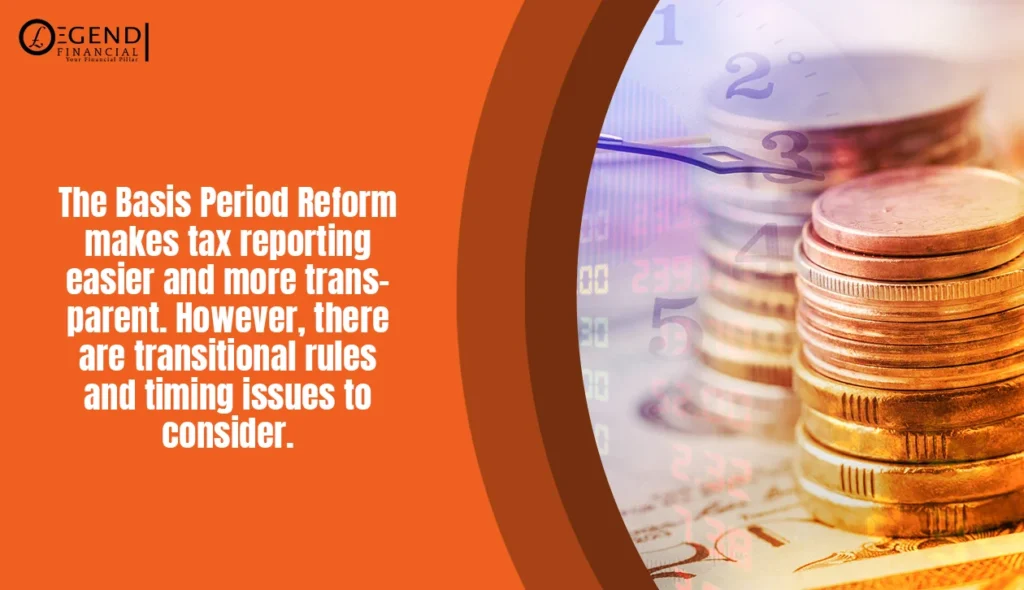Contents
Those who are self-employed or in a partnership need to know about a major tax change: “Basis Period Reform.” This new approach to taxing business profits in the UK aims to simplify things by aligning everyone’s tax calculations to the standard tax year. This guide breaks down everything in simple terms. Understand what is changing, how it impacts you, and what steps you may need to take.
So, let’s get started.
What Is Basis Period Reform?
Previously, sole traders and partnerships could choose any accounting year-end. This is because HMRC taxed profits from the 12 months ending in the tax year (6 April to 5 April). However, this flexibility often caused confusion, especially with overlapping profits.
The Basis Period Reform simplifies this by taxing all unincorporated businesses on profits earned during the actual tax year (6 April to 5 April). It makes tax reporting clearer and more consistent, but transitional rules apply.
For detailed information on this, check out Basis Period Reform HMRC guidance.

Who Is Affected?
This reform mainly affects:
- Sole traders and unincorporated partnerships
- Businesses not using a 5 April or 31 March year-end
- Anyone who reports business income through Self-Assessment
If your accounting year already ends on 5 April or 31 March, you are already aligned with the tax year and will not experience major changes. However, if your business uses a different accounting date, like 30 June, 31 December, or any other, you will need to adjust.
Basis Period Reform Transitional Year: 2023/24
The 2023/24 tax year marks the transitional phase of the Basis Period Reform. During this year, businesses will be taxed on profits earned from the end of their last basis period up to 5 April 2024.
To offset this, you can use overlap relief: a deduction for profits previously taxed twice when you started your business. You can spread this transition profits evenly over five tax years, from 2023/24 to 2027/28.
Important: These transition profits are treated separately by HMRC. They will not unfairly affect your entitlement to income-based benefits or allowances, such as child benefit or the personal allowance taper for higher earners.
Example
If your accounting year-end is 31 December, under the old rules, your 2022/23 tax return would cover profits from 1 January 2022 to 31 December 2022. Under the transitional rules for 2023/24, you will be taxed on profits from 1 January 2023 to 5 April 2024 (a 15-month period).
Basis Period Reform 2025: How Tax Will Work from Now Onwards
Starting from the 2024/25 tax year (beginning 6 April 2024), your taxable profits will be based strictly on the tax year. This is the new standard for all sole traders and partnerships under the Basis Period Reform.
If your business does not use an accounting year-end of 31 March or 5 April, you will need to apportion profits from two accounting periods to match the tax year. This simply means combining figures from two sets of accounts to accurately report income for the 6 April to 5 April period.
In cases where your accounts are not finalized by the Self-Assessment deadline, you may need to use provisional figures in your return. These must be updated later with the actual numbers once your accounts are ready.
What You Should Do Now
Now that you understand the Basis Period Reform, it is time to act.
- Check if your accounting date is affected. If your year-end is not between 31 March and 5 April, you will need to make adjustments to align with the new tax year rules.
- Find out if you have any unused overlap relief from previous years.
- Assess how this change could impact your taxable profits for the transition year, and whether spreading transition profits over five years makes sense for you.
We have outlined these 3 steps in a simple way, but they can get complicated fast. That is where Legend Financial can help. We identify your overlap relief to calculating your transition profits, to make the most of every available tax break.
FAQs
Does Basis Period Reform affect limited companies?
No. The Basis Period Reform only applies to unincorporated businesses. Sole traders and partnerships. Limited companies already follow the tax year for Corporation Tax purposes.
Can I still choose any accounting date after the reform?
Yes, you can keep your preferred accounting date. However, if it does not align with the tax year (31 March or 5 April), you will need to apportion profits across two periods each year, which may increase admin and complexity.
What records should I keep to support apportionment and provisional figures?
Keep clear, dated records of income and expenses, especially for periods that span two accounting years. You should also document the basis for any provisional figures used and when actuals are later submitted.
Will this change affect my payments on account?
Yes, potentially. If your taxable profits increase in the transitional year, it may affect your payments on account for the following year, so it is important to budget for this possibility.
What happens if I do not update provisional figures on time?
If you fail to replace provisional figures with actual ones, you risk penalties or incorrect tax calculations. HMRC expects you to amend your return as soon as accurate figures are available.
Facing the Future of Business Tax
The Basis Period Reform represents a fundamental shift in how your business’s profit is taxed in the UK, moving everyone to the tax year basis. Planning ahead and getting the right calculations done is key for all taxpayers affected. At Legend Financial UK, we are ready to guide you through every step of this reform.
Contact us today for a smooth transition and get expert help with your business tax affairs.












